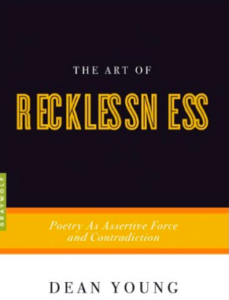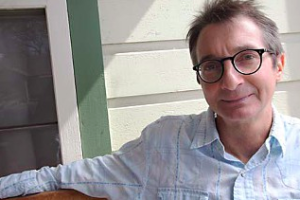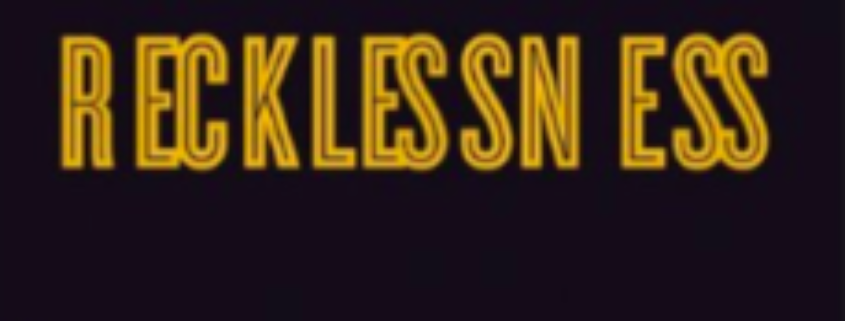Writers Read: The Art of Recklessness by Dean Young

I was hoping that at some point I would figure out what this book is about—maybe you are too. – from The Art of Recklessness: Poetry as Assertive Force and Contradiction by Dean Young (p. 153)
It’s difficult to digest all of The Art of Recklessness into an annotation, probably by design. Writer Dean Young often loses the reader with lines like: “It is the very overabundance of referential capacity that makes for the breakdown of any single referential stability, or at least conscribes it.” Then a few pages later, he redeems his academic-speak with: “If you want to learn how to cook a lobster, it’s probably best not to look to poetry. But if you want to see the word lobster in all its reactant oddity, its pied beauty, as if for the first time, go to poetry. And if you want to know what it’s like to be that lobster in the pot, that’s in poetry too.”
What you’ll like here: Young’s ideas of desecration and recklessness.
What you won’t like: long, overly academic dissections of historical movements, pieces of art, poems, poets, etc.
The Art of Recklessness will remind you, slightly, of Poe’s Eureka or D.H. Lawrence’s The Fantasia of the Unconscious. Both are long, if sideways, ars poetic, and profoundly affective, in ways you can only suspect and catch out of the corner of your eye. They seem to employ a strategy of over-complicated, drawn out, partly absurd dissection and analysis interrupted by bright shafts of dark profundity—like poison in a hearty soup.
You’ll make a lot of marks in this book; many, many lines will be underlined, many things will be drawn—squiggles of importance and notes written in there.
Young’s book, though, doesn’t quite reach those magical depths. Perhaps that’s a personal failure—failure of audience not author. There is so much in the book that is good, that expands and unfolds truths about poetry and about the self, but this reader may not have reaped any real dark truth or transformation.
So, you’ll like his ideas of desecration as a creative effort to reach divinity—destroy the idol and in the pieces something shines through. And you really will be affected by his recklessness—much more so, though, after actually seeing how all this works in his poetry.
You’ll make a lot of marks in this book; many, many lines will be underlined, many things will be drawn—squiggles of importance and notes written in the margins. It’s a good book, but long. It takes a long time climbing over a lot of big words, college words.

Dean Young. Photo by Jana Birchum.
You’ll also really appreciate this:
“We must cut ourselves out and off to move toward a sophisticated sense of the art beyond our sense of self, to develop a historical sense, to see what we write in dialogue with the poetry of the past, to see poems as things, material to be manipulated…We must risk a loss of passionate connection to distance ourselves from our work, to grow a little cold to it in order to revise, in order to look at a poem as a series of decisions.”
That will ring true. You hadn’t really thought of that deliberate cutting out so deeply. Most of your poetry was all personal eruption, for nobody but the passion of the moment. And you like all that stuff, but it’s often unsophisticated and uninteresting. Too personal, much self-pity, self-centeredness.
So you’ll appreciate this idea of distance, deliberate distance, and recognize yet fear the risk of it. The calculated gaze of an author is much different from the curiosity of the child. “Poetry is not discipline,” Young says, but it is. It’s a series of decisions, made recklessly and with much risk. You’ll like that. The distance isn’t always so far, but it’s so the connections and passion aren’t hugged to death and smothered in petty subjectivity.
Also, the idea of conversing with history and recognizing the conversation is important and fun, too, like a dorky sort of party. Young’s position is that poetry is not just a revolt against convention, which is adolescent and reductive, but a dialogue with what is being resisted, historically. The dialogue is then affirmative and playful and not so self-serious.
Young’s position is that poetry is not just a revolt against convention, which is adolescent and reductive, but a dialogue with what is being resisted, historically.
You’ll sometimes feel that he is on the edge of something, and you’ll want him to go further, risk a little more, believe a little more. He says in his discussion of modernity: “The futility of existence is related to the inability of identity, of subject, to take on the stability of authority and knowledge, of insight, to not be a victim of itself, the jarring loose of the single vanishing, point meaning the vanishing of god.” He goes on to disagree, thankfully, and makes the metaphor that the beauty, not futility, of the self is in this inability to hold together. That the destruction is like music and life is like music, moving from one electric disruption to the next, constantly rebuilding. “If there is divinity in us,” he ponders, “it is in the process of allowing ourselves to unmake and remake ourselves.” So close! A tease! What is that process of allowing, Dean? Go on, more.
The self is fluid. Yes you’ll want him to say. Always deconstructing, stitching itself up, but there is the possibility of decision. Self can be discipline, but vulnerable discipline. A gifted, magic discipline that feels kin to surrender, that comes from somewhere else other than inside, not you. He suggests as much in his poems, too. They are not without a believer’s hope, but are beautiful in their hope.
Also, you’ll keep remembering bits out of order, like debris floating up to the surface. You’ll enjoy when he muses about copying, “… your originality will come from your inability to copy well: YOUR GENIUS IS YOUR ERROR.” To seek out that error, it’s playful. It’s funny. You’ll want your poetry to be that.
Young, Dean. The Art of Recklessness: Poetry as Assertive Force and Contradiction. Minneapolis: Graywolf, 2010.






